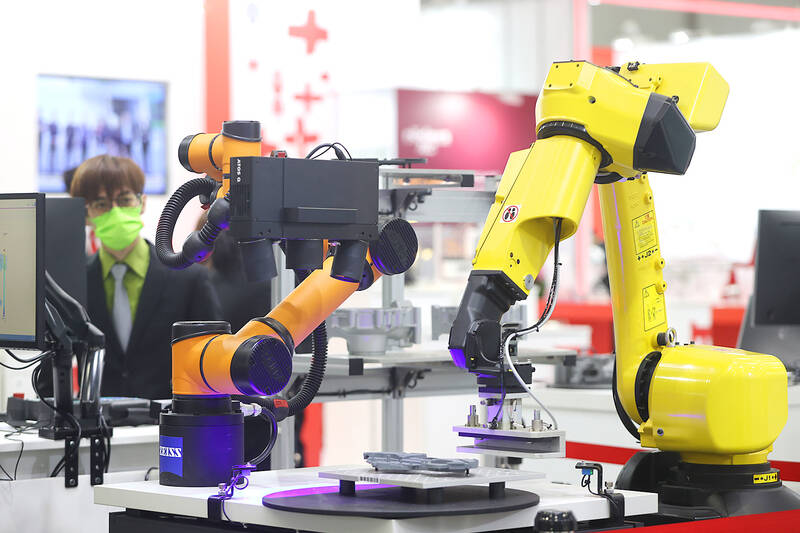The Taipei International Machine Tool Show (TIMTOS) opened yesterday, with more than 1,000 local and international exhibitors showcasing their products.
It is to run through Saturday at the Taipei Nangang Exhibition Center’s halls 1 and 2, as well as the Taipei World Trade Center’s Exhibition Hall 1.
Exhibitors from 18 countries and territories are showcasing their products to more than 4,000 potential buyers expected to attend the trade show, the organizers said.

Photo: CNA
An online version of the exhibition would run until April 6, they said.
The products being displayed include metal-cutting machine tools, machine tool parts, laser punching machines, metal forming machinery, casting and forging equipment, tube and wire processing tools, and surface treatment equipment.
More sophisticated control systems and industrial robots, as well as inspection and measurement instruments and software, are also being displayed.
Denmark, Germany, Switzerland and the US opened national pavilions at the show.
The show is organized by the government-sponsored Taiwan External Trade Development Council (TAITRA, 外貿協會) and the Taiwan Association of Machinery Industry (TAMI, 台灣機械公會).
The event is expected to attract 50,000 visitors from home and abroad, making it an important indicator for economic recovery this year, TAITRA said.
At the exhibition’s opening ceremony yesterday, TAMI chairman Larry Wei (魏燦文) said the trade show is expected to create more than US$2 billion in business opportunities.
After facing the challenges of the COVID-19 pandemic and global economic uncertainty over the past three years, the machinery sector has regained its footing to unveil advanced products that reduce carbon emissions, as well as optimized services, he said.
Taiwan is the world’s fifth-largest machine tool exporter, Wei said, after the nation’s overseas sales last year rose 8.6 percent annually to US$3.02 billion.
President Tsai Ing-wen (蔡英文) said at the opening ceremony that the local machinery industry is the third sector in Taiwan to generate more than NT$1 trillion (US$32.71 billion) in output value, after the semiconductor and optoelectronics sectors, reflecting its competitiveness.
The local machinery industry has created more than 350,000 jobs since 2017 as it transformed itself from a precision industry into a smart industry, she said.
TAITRA chairman James Huang (黃志芳) said it is particularly remarkable that Turkey sent a delegation of 20 potential buyers to the trade show, despite the country’s southeast being struck by a magnitude 7.8 earthquake last month.
Turkey was the third-largest buyer of Taiwan’s machining centers last year, Huang said.
There is strong potential for the two sides to continue cooperating on machinery in the post COVID-19 era, he added.
Also attending the opening ceremony, American Institute in Taiwan Director Sandra Oudkirk praised the performance of Taiwan’s machinery industry, saying Taiwan has played a critical role in global supply chains.

COMPETITION: AMD, Intel and Qualcomm are unveiling new laptop and desktop parts in Las Vegas, arguing their technologies provide the best performance for AI workloads Advanced Micro Devices Inc (AMD), the second-biggest maker of computer processors, said its chips are to be used by Dell Technologies Inc for the first time in PCs sold to businesses. The chipmaker unveiled new processors it says would make AMD-based PCs the best at running artificial intelligence (AI) software. Dell has decided to use the chips in some of its computers aimed at business customers, AMD executives said at CES in Las Vegas on Monday. Dell’s embrace of AMD for corporate PCs — it already uses the chipmaker for consumer devices — is another blow for Intel Corp as the company

ADVANCED: Previously, Taiwanese chip companies were restricted from building overseas fabs with technology less than two generations behind domestic factories Taiwan Semiconductor Manufacturing Co (TSMC, 台積電), a major chip supplier to Nvidia Corp, would no longer be restricted from investing in next-generation 2-nanometer chip production in the US, the Ministry of Economic Affairs said yesterday. However, the ministry added that the world’s biggest contract chipmaker would not be making any reckless decisions, given the weight of its up to US$30 billion investment. To safeguard Taiwan’s chip technology advantages, the government has barred local chipmakers from making chips using more advanced technologies at their overseas factories, in China particularly. Chipmakers were previously only allowed to produce chips using less advanced technologies, specifically

MediaTek Inc (聯發科) yesterday said it is teaming up with Nvidia Corp to develop a new chip for artificial intelligence (AI) supercomputers that uses architecture licensed from Arm Holdings PLC. The new product is targeting AI researchers, data scientists and students rather than the mass PC market, the company said. The announcement comes as MediaTek makes efforts to add AI capabilities to its Dimensity chips for smartphones and tablets, Genio family for the Internet of Things devices, Pentonic series of smart TVs, Kompanio line of Arm-based Chromebooks, along with the Dimensity auto platform for vehicles. MeidaTek, the world’s largest chip designer for smartphones

TECH PULL: Electronics heavyweights also attracted strong buying ahead of the CES, analysts said. Meanwhile, Asian markets were mixed amid Trump’s incoming presidency Taiwan Semiconductor Manufacturing Co (TSMC, 台積電) shares yesterday closed at a new high in the wake of a rally among tech stocks on Wall Street on Friday, moving the TAIEX sharply higher by more than 600 points. TSMC, the most heavily weighted stock in the TAIEX, rose 4.65 percent to close at a new high of NT$1,125, boosting its market value to NT$29.17 trillion (US$888 billion) and contributing about 400 points to the TAIEX’s rise. The TAIEX ended up 639.41 points, or 2.79 percent, at 23,547.71. Turnover totaled NT$406.478 billion, Taiwan Stock Exchange data showed. The surge in TSMC follows a positive performance